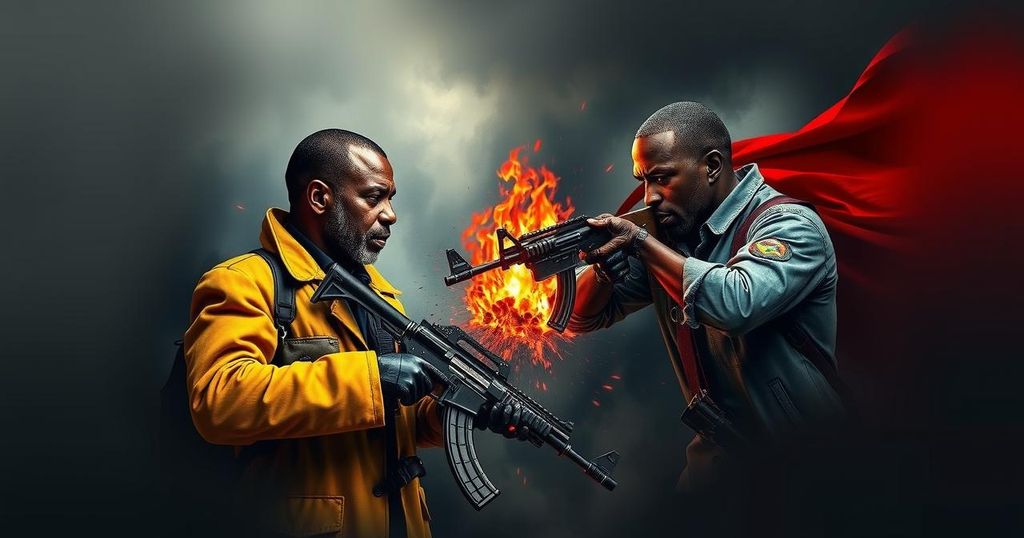The Angolan government raised concerns over renewed violence in eastern DRC, which contravenes recent ceasefire agreements. Angola has been mediating between the DRC and Rwanda amid accusations of military support for rebel groups. Despite assurances of non-support for certain militias, clashes continue, raising urgent humanitarian needs as thousands face displacement and violence risks.
The Angolan government has expressed serious concerns following renewed violence in the eastern Democratic Republic of Congo (DRC), occurring at a time when Luanda was advocating for a more enduring ceasefire after a month of relative calm. In a press release issued on Tuesday, Angolan authorities characterized the recent clashes as a clear violation of both the principles and intentions arising from the ministerial meeting held on July 30, as well as the ceasefire that was officially established at midnight on August 4. Angola has taken an intermediary role between two neighboring countries, the DRC and Rwanda, both of which have made allegations against each other regarding support for rebel factions that threaten to destabilize their governments. A recent diplomatic meeting in Luanda, which occurred two weeks ago, focused on re-affirming commitments to a peaceful resolution to the conflict. The DRC government has assured its counterpart in Kigali that they will not support the Democratic Forces for the Liberation of Rwanda (FDLR), a group classified as hostile by Rwanda, provided that Rwanda withdraws its support for the M23 rebel group. In its statement, Angola unequivocally condemned the violence, asserting that such actions impede the ongoing negotiations aimed at achieving lasting peace in the eastern DRC. The country urged all conflict parties to adhere to the ceasefire, as reiterated during the ministerial meeting on September 14. This renewed fighting, reported in the vicinity of Kalembe, primarily involved clashes between the Wazalendo self-defense group, allied with the Congolese army, and M23 rebels. Local sources reported that the Congolese army managed to reclaim control of Kalembe. Juvenal Munubo, a former Member of Parliament from Walikale, noted that the NDC Rénové armed group has regained control with logistical support from the Congolese army (Fardc) and urged further consolidation of this military victory. Additional commentary from MP Willy Mishiki indicated the rebels’ intention to seize territories in South Kivu, Tshopo, and Maniema provinces. Despite the rise in violence, officials in Kinshasa have refrained from commenting on the ceasefire’s breakdown. Since the ceasefire commenced in August, there had been some positive developments, with displacements decreasing as certain refugees began returning to their homes, which they perceived as increasingly secure compared to crowded camps. In terms of political frameworks, the DRC has categorically ruled out any negotiations with M23, although talks are ongoing with Rwanda. In an October 12 meeting, the foreign ministers of both nations agreed to address outstanding security concerns relating to a proposed peace agreement facilitated by Angola. The establishment of an ad hoc verification mechanism to oversee peace efforts has also been agreed upon, with plans to launch this initiative officially in Goma, DRC, no later than November 5, 2024. The recent violence has resulted in at least 14 civilian injuries, with many fleeing their residences. According to the United Nations High Commissioner for Human Rights, projections show that approximately 940,000 individuals will be displaced in 2024, contributing to an alarming total of nearly seven million displaced persons in the DRC. These displacements expose civilians, particularly in North Kivu, to severe overcrowding and significant human rights violations, including incidents of sexual violence.
The violence in the eastern Democratic Republic of Congo, exacerbated by the fragile ceasefire agreements and ongoing tensions between the DRC and Rwanda, highlights the complex geopolitical landscape of the region. Angola’s role as a mediator in this conflict underscores its commitment to regional stability and emphasizes the importance of international dialogue in resolving the persistent crises. Recent negotiations have focused on balancing security concerns while mitigating humanitarian consequences amid ongoing military conflicts involving various armed groups.
The renewed hostilities in the eastern DRC have raised alarms in the Angolan government, prompting calls for adherence to the ceasefire established earlier this month. As Angola seeks to mediate between conflicting parties, it is imperative for all involved to respect the agreements made to foster lasting peace. The humanitarian impact of the conflict is increasingly dire, necessitating a concerted effort from regional leaders and international bodies to ensure the safety and well-being of affected populations.
Original Source: www.theeastafrican.co.ke







